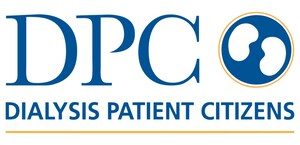
New Kidney Patient Data Shows Strong Need for Immunosuppressive Drug Coverage Legislation
DPC Urges Swift Passage of Bill to Extend Drug Coverage for Transplant Patients
WASHINGTON, Sept. 18, 2012 /PRNewswire-USNewswire/ -- Data from a recent survey of Dialysis Patient Citizens' (DPC) kidney disease patient membership highlights the strong need for swift Congressional action on the Comprehensive Immunosuppressive Drug Coverage for Kidney Transplant Patients Act of 2011 (H.R. 2969/S.1454). The survey data released today reinforces concerns that many dialysis patients are not on the kidney transplant list due to worries regarding the cost of immunosuppressive medications after their Medicare coverage ends. This legislation, which extends Medicare coverage of these medications for the life of the transplant, will not only improve the health of these patients but could lead to substantial Medicare savings.
Recently, DPC partnered with Ipsos, a global independent market research firm, to administer and compile results of a survey of DPC's patient membership. The results showed that 64% of respondents are not currently on a kidney transplant list and of those 6% cited financial reasons, including not being able to afford the immunosuppressive medications, as the primary financial concern. This number could be even higher, as 18% of survey respondents cited personal reasons for not applying for a transplant list, many of which could be financial in nature. One anonymous patient even stated, "I am not on the list, because if I was to receive a transplant I would not be able to afford the drugs to maintain the transplant." This survey was also made possible with a grant from Abbott Nutrition.
The Comprehensive Immunosuppressive Drug Coverage for Kidney Transplant Patients Act of 2011 would eliminate the current time limitation and extend Medicare Part B coverage for kidney transplant recipients for the purpose of immunosuppressive drugs only. This cost-effective, common-sense legislation will not only improve the lives of countless kidney transplant patients, but also use our limited federal resources more effectively.
Congressional action could also generate additional Medicare savings by preventing early rejection of kidney transplants for patients who can no longer afford their medications. A recent New England Journal of Medicine report estimates that extending immunosuppressive drug coverage will save Medicare approximately $200 million annually by helping to prevent early kidney rejections.
About H.R. 2969/S.1454:
Since 1973, Medicare has provided health coverage for all patients with kidney failure regardless of age through the Medicare End Stage Renal Disease (ESRD) Program. This program covers dialysis services, transplantation, immunosuppressive drugs and other medically important services. But for those under 65, Medicare coverage ends 36 months after a kidney transplant. After that three-year period, many of these patients struggle to find coverage or to purchase the anti-rejection medications needed to maintain the transplant. As a result, patients often end-up back on dialysis sooner than they should, increasing both their time on dialysis as well as everyone's wait for a transplant. Others don't even apply for the transplant list as they know they can't afford the drugs and continue on dialysis indefinitely.
Extending immunosuppressive drug coverage for the life of the transplant is both good public policy and fiscal policy, as the prospect of going back on dialysis is bad for both the patient and our health care system. Medicare currently spends approximately $77,500 per year on a dialysis patient, which does not have any time limitation. Medicare then incurs an average first year cost of more than $100,000 for renal transplantation and will pay for both dialysis and re-transplantation in the case of organ failure. Medicare only spends an average of $19,000 on a kidney transplant recipient per year after the transplant, approximately $58,500 less than pre-transplant dialysis patients.
The Comprehensive Immunosuppressive Drug Coverage for Kidney Transplant Patients Act of 2011 would eliminate the current time limitation and extend Medicare Part B coverage for kidney transplant recipients for the purpose of immunosuppressive drugs only. All other Medicare coverage would end 36 months after the transplant. For patients who have another form of health insurance, Medicare would be the secondary payer. Beneficiaries would be responsible for a premium amount to be determined by the Secretary of HHS, as well as applicable deductible and coinsurance requirements. The bill also amends the Employee Retirement Income Security Act of 1974 (ERISA) to require that group health plans currently providing coverage of immunosuppressive drugs for kidney transplant recipients maintain this coverage.
About Dialysis Patient Citizens:
DPC is America's largest patient-led organization representing dialysis patients. With a membership of more than 24,000 dialysis and pre-dialysis patients and their families, DPC's mission is to improve the quality of life of dialysis patients by engaging policy makers, providers and the public. Through patient education, empowerment and advocacy, DPC works to increase awareness about kidney disease and promote favorable public policy.
For more information on the survey results: https://filemanager.capwiz.com/filemanager/file-mgr/dpcitizens/09_18_12_Immuno_Fact_Sheet_Final_Draft__2_.docx
PRESS CONTACT:
Jessica Nagro
202-789-6931
SOURCE Dialysis Patient Citizens






Share this article